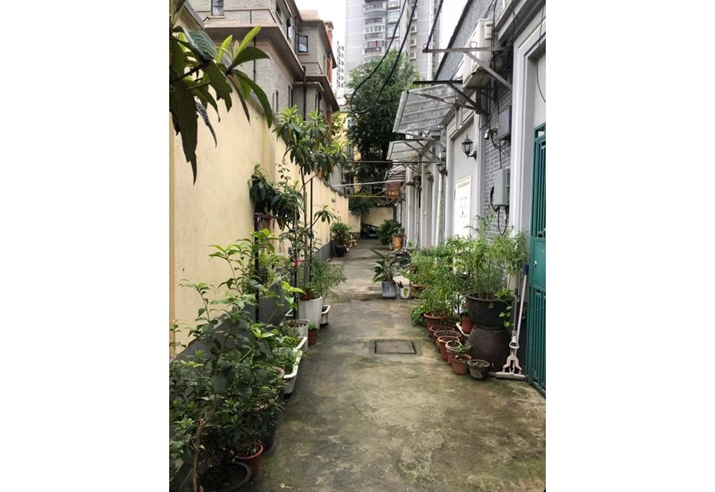| Voice |
| Life in the lanes | |
|
|
 A lane in Shanghai's former French Concession (EMILY ASPINALL)
Holding the title of one of the biggest cities in the world, the densely populated Shanghai certainly isn't shy of apartments; homes in different shapes and sizes stretch far (and high) all across its iconic skyline. What makes Shanghai unique to me, is the presence of the old, charismatic lane houses. These lane houses, called shikumen, are a traditional Shanghainese architectural style combining Western and Chinese elements that first appeared in the 1860s. Shikumen are arranged into dense and often maze-like alleys, called nongtang. This traditional style of accommodation once housed over 60 percent of Shanghai's downtown population and now act as an insight into traditional Chinese culture. I found myself particularly drawn to the lanes when I first arrived in Shanghai in 2017. Tucked away from the hustle and bustle of the busy streets, they provided me with a calm moment just a few steps away from the chaos of the main thoroughfares. The lanes also provide a chance to observe the daily lives of Shanghainese. Finding somewhere to live as a foreigner in Shanghai can be a daunting task, with many opting for high-rise, newly renovated, modern apartments. Yet my decision to live in a shikumen provided a fascinating insight into the structure of Chinese society, the motivations of Chinese people and highlighted the importance of family and friends. My favorite aspect of life in the lanes was the community spirit. Many of my neighbors seemed to spend most of their days shuffling around the lane, whether it be hanging laundry, chopping vegetables or just having a chat—it was all done outside of their front door. My complex consisted mainly of occupants over 70 years old, all of whom seemed to be happily enjoying a quiet retirement in the lane. One resident was nearing 100, yet despite her age she still strolled around the lane daily, feeding the cats and smiling pleasantly. She informed me she was born in the lane and was curious to ask me lots of questions. How much rent am I paying? Am I married? Have I eaten today? Though we didn't speak the same language, her young granddaughter would often translate my answers from English to Shanghai dialect and I relished these unique exchanges. I was fascinated to think of the rich and long life my neighbor had experienced growing up in Shanghai and all the vast changes to the city she would have witnessed. She was also fascinated to learn more about my culture and we exchanged conversations about the various people who had passed through the lane during her lifetime. Life in the lane provided such a rich insight into Chinese culture. In the mornings, another elderly male neighbor would perch outside his front door at 6 a.m. on a small bamboo chair and play the pipa (sometimes called the Chinese lute). Others would gather in the afternoon to wash and prepare their vegetables and meat for the evening while chattering away. Every day around 6 p.m. they would begin cooking, as delicious fragrant smells of garlic, ginger and chili would waft across the lane. Once dinner time had ended, they would leave scraps of rice and meat for the cats outside their doors and begin a slow walk to aid food digestion. I was often amused by the dizzying array of laundry hanging from the electrical wires that zigzagged across the lane. I observed that on hot, sunny days, the lane would quickly become full of color, in the form of drying clothes, underwear and bed linen. Every door in the lane was surrounded by blooming green plants, neighbors would unfold chairs and recline, often wearing pajamas, drink green tea and people watch. Each lane in Shanghai feels so personal, like a tiny neighborhood. Every time I stepped into my lane after a long day of work, a sprawling metropolis suddenly felt like a tiny, communal village. As a foreigner, living in the lane taught me about the strong sense of community that is so intrinsic to Chinese society and on a more simple level—that pleasure can be found from the small things in life: food, people and sunshine. The author is a Briton formerly living in Shanghai Comments to dingying@bjreview.com |
|
||||||||||||||||||||||||||||
|